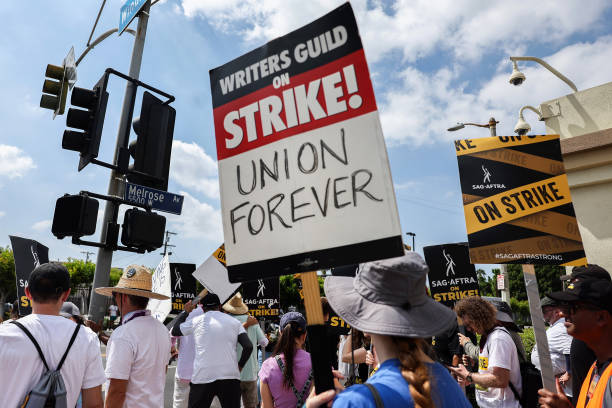A 146-day cliffhanger: Hollywood’s screenwriters deserve a happy ending
The strike was epic, and the good guys seem to have won: so next time we sit in front of the TV or the cinema screen, writes David Barnett, let’s remember who the real stars of the show are


For almost five months, US screenwriters have been on strike, going head-to-head with the studio bosses on pay and the potential threats of artificial intelligence to their earning potential.
On Sunday the Writers Guild of America (WGA) announced a breakthrough in negotiations which they called “exceptional” and which promised “meaningful gains and protections” for writers.
Pending the WGA members accepting the deal, it could mean writers are putting down their placards and picking up their laptops as soon as today.
At 146 days, the strike has gone on longer than the 2007 industrial action, which lasted 99 days. Studio execs held out a lot longer before putting an offer on the table which the WGA felt was suitable – and that might be the fault of us, the consumers.
Many of us have doubtless noticed the strike, reported in mainstream media and widely featured on social media. But how many of us can see it’s truly impacted our viewing habits?
The list of delayed shows and movies because of the strike is a long one, especially since the SAG-AFTRA actors’ union came out on strike in support of the writers’ action.
Lord of the Rings spin-off The Rings of Power, Game of Thrones series House of the Dragon, two Walking Dead spin-offs, a new adaptation of Anne Rice’s Interview with the Vampire, Billions, American Horror Story; Star Warsseries Andor... all were delayed at various stages of filming or production.
Without writers, there is no story. There is no script. There are no heart-stopping moments or tear-jerking scenes
On the big screen, the strike pushed back expected premieres of a clutch of Marvel movies including new outings for Captain America, The Avengers and Blade, plus sci-fi sequels for Avatar, Dune and Tron.
The problem for the writers, and a possible reason that the studios felt they could drag this on a lot longer than the last strike, is that the viewing landscape is a lot different from 2007.
In a way, the writers have been victims of their own success in terms of their incredible output and the way our consumption of visual popular culture has irrevocably changed over the past decade.
In 2007, when the networks were starved of product, it was far more noticeable to the viewing public. Holes in the schedules started to gape, and the absence of the writers was very keenly felt. This led directly to the rise of reality television as we know it today — relatively cheap content that didn’t need a team of writers to make it work; simply put a load of celebrities or members of the public in a room, or on an island, or in the jungle and let them speak for themselves.
Today, though, who watches TV when it’s broadcast on the main networks? Streaming services and catch-up TV mean we can watch shows whenever we feel like it – sometimes months down the line from when they were released.
After all, there’s just so much to watch, across the terrestrial channels, Netflix, Disney, Prime, Sky, etc, there will be people only just getting around to watching The Last of Us or the newest series of The Handmaid’s Tale right now, months or even years after they were first released.
Yes, fans will be waiting impatiently for the new seasons of those shows to drop, but the delays caused by the strike will be less painful, when there is so much else sitting on the streaming apps and catch-up sections to be going on with.
But that huge library of content would not last forever, and the studios have realised that. No matter how much there is, we eventually want more. And that’s why the writers have, hopefully, won. And why we should applaud them for their incredible efforts, holding out for almost five months.
All that content is there thanks, first and foremost, to the writers. Without writers, there is no story. There is no script. There are no heart-stopping moments or tear-jerking scenes. Without writers, there are no shows.
The writers’ names might not be on the posters or the trailers, you probably wouldn’t know the screenwriter of your favourite series or movies if you fell over them in the street.
But, this epic strike has hopefully shown us that they are truly the stars of the shows, and that we — and their employers — should value them just as much as they deserve to be. Through sheer grit and determination, they’ve written their own ending, and as in all good stories, the good guys have won again.
Join our commenting forum
Join thought-provoking conversations, follow other Independent readers and see their replies
Comments


Bookmark popover
Removed from bookmarks